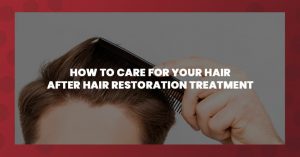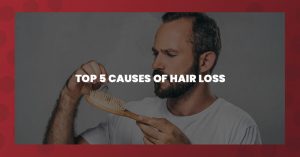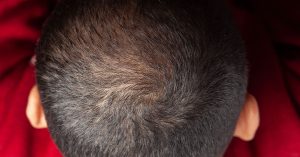Testosterone is an androgenic hormone responsible for male functions and characteristics like bone mass, muscle strength, fat distribution, sperm production, and libido. In women it plays a role in bone, breast, and reproductive health. Testosterone also affects hair development and hair loss in both sexes… although perhaps not as directly as many believe.
Does Testosterone Cause Hair Loss?
Testosterone and hair loss are closely linked. It is often blamed for androgenic alopecia (male pattern baldness) but it isn’t a direct cause. Androgenic alopecia is actually a genetic condition that causes individuals to be more susceptible to the effects of dihydrotestosterone (DHT) – a testosterone byproduct that causes hair follicles to shrink.
The genes responsible for hair follicle receptors can cause heightened sensitivity to DHT, which triggers hair loss through shorter growth phases and increasingly finer, weaker hairs. Strangely, this type of hair loss occurs mostly on the head while hair on other parts of the body may actually become thicker.
Women also experience androgenic alopecia through the same process, despite having much lower levels of testosterone. In women, this type of hair loss tends to occur diffusely on top of the scalp, as opposed to the M-shaped balding pattern typically experienced by men with the same condition.
When one’s reproductive organs produce too many hormones (known as hypergonadism), testosterone levels rise, convert to DHT, and cause excess hair loss or early balding. Conversely, when testosterone levels are too low (hypogonadism), hair follicles are deprived of the hormones needed to initiate and maintain hair growth. Low testosterone hair loss can grow in any pattern but often presents as thinning hair everywhere on the body. This is why having balanced hormones is crucial to good health – and healthy hair.
Is Hair Loss from Testosterone Reversible?
If you suspect you have a testosterone imbalance, it’s important to address the issue with your physician. Signs of a possible testosterone imbalance include: fatigue, depression, lack of sex drive, erectile dysfunction, loss of muscle mass, weight gain, loss of body hair, and reduced facial hair growth.
If your hair loss is indeed caused by a genetic sensitivity to DHT, there are treatments that can disrupt the process or replace lost hair. These include the following:
- Finasteride (Propecia), a prescription-only oral medication to inhibit the enzyme that converts testosterone to DHT. It is the most commonly used DHT blocker at this time. Finasteride is only appropriate for men and should not be used by women due to potential side effects.
- Dutasteride (Avodart), an oral medication most commonly prescribed for an enlarged prostate but is currently being used off-label to address male pattern baldness. Early studies indicate it may be even more effective at blocking DHT than industry-standard Finasteride.
- Minoxidil (Rogaine), in oral and topical forms. It isn’t a DHT blocker, but it can slow down hair loss and strengthen existing hair while you address the underlying causes of your hair loss.
- Ketoconazole, an antifungal treatment that shows promise for off-label use to combat DHT-related hair loss. Research into its efficacy is still ongoing.
In addition to these medications, there are other nonsurgical (as well as surgical) options to stimulate hair growth or to replace lost hair. From platelet-rich plasma injections to low-level laser therapy to FUT and FUT surgical hair replacement… there are many ways to slow down hair loss or replace lost hair.
Does Testosterone Boost Hair Growth?
Low testosterone hair loss is possible. That said, increasing your testosterone levels won’t guarantee to reverse hair loss or grow your hair back.
As indicated above, hormones can play a part in hair loss… but it would be foolish to assume that hair loss always comes from low testosterone levels. Instead, the specific cause of your hair loss must be diagnosed. Only then can treatment options be evaluated.
Set Up a Consultation to Determine the Cause of Your Hair Loss
If you are experiencing hair loss, The Hair Center of Nebraska can determine its cause and guide you in selecting a treatment plan that is right for you. By setting up a consultation, you are taking the first step on your journey to a fuller head of hair and a better life. To set up an appointment, contact us today.






